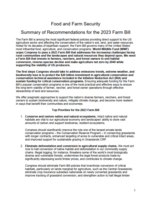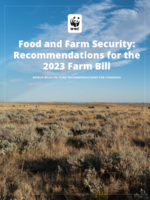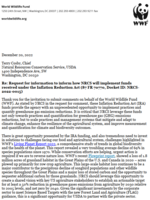Learn more about our impact
Learn more about our impact
- What we care about
- People
- Places
- Species
- Climate crisis
- Sustainability
- How we work
- Public policy
- Science
- Business
- Wildlife conservation
About WWF
WWF works to sustain the natural world for the benefit of people and wildlife, collaborating with partners from local to global levels in nearly 100 countries.





 Stephanie Cappa
Director, Policy and Government Affairs
Stephanie Cappa
Director, Policy and Government Affairs
 Gina De Ferrari
Senior Advisor, US Government Partnerships
Gina De Ferrari
Senior Advisor, US Government Partnerships
 Ben Freitas
Manager, Ocean Policy
Ben Freitas
Manager, Ocean Policy
 Ellen Giordano
Senior Director, US Government Partnerships
Ellen Giordano
Senior Director, US Government Partnerships
 Benjamin Hunt
Senior Policy Advocate for International Climate and Policy, Policy & Government Affairs
Benjamin Hunt
Senior Policy Advocate for International Climate and Policy, Policy & Government Affairs
 Mary Naby
Executive Assistant, Policy and Government Affairs
Mary Naby
Executive Assistant, Policy and Government Affairs
 Alejandro Pérez
Senior Vice President, Policy and Government Affairs
Alejandro Pérez
Senior Vice President, Policy and Government Affairs
 Carlos Quintela
Senior Program Officer, US Government Partnerships
Carlos Quintela
Senior Program Officer, US Government Partnerships
 Natalie Tarasar
Program Officer, US Government Relations
Natalie Tarasar
Program Officer, US Government Relations
 Anthony Tusino
Senior Program Officer, Plastic Policy Advocacy
Anthony Tusino
Senior Program Officer, Plastic Policy Advocacy
 Renee Albrecht
Senior Policy Advocate, Food and Freshwater
Renee Albrecht
Senior Policy Advocate, Food and Freshwater
 Tarunika Anand
Policy Advocate, Policy and Government Affairs
Tarunika Anand
Policy Advocate, Policy and Government Affairs